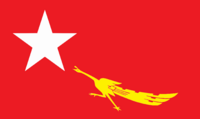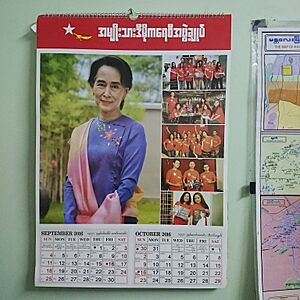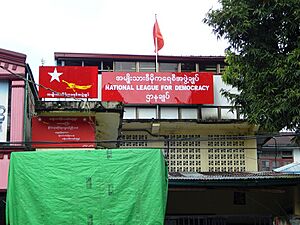National League for Democracy facts for kids
Quick facts for kids
National League for Democracy
အမျိုးသား ဒီမိုကရေစီ အဖွဲ့ချုပ်
|
|
|---|---|
| Abbreviation | NLD |
| Leader | Aung San Suu Kyi |
| Founders | Aung Shwe Tin Oo Kyi Maung Aung San Suu Kyi Aung Gyi |
| Founded | 27 September 1988 |
| Banned | 28 March 2023 |
| Headquarters | 97B West Shwe Gon Daing Road, Bahan Township, Yangon |
| Ideology | |
| Political position | Centre |
| Regional affiliation | Council of Asian Liberals and Democrats (observer) |
| Colours | Red |
| Party flag | |
 |
|
| Website | |
| nld-official.org (dead) (7 March 2021 archive) |
|
The National League for Democracy (NLD) is a political party in Myanmar, also known as Burma. It was once the country's main ruling party. The NLD believes in a type of government called liberal democracy, where people have many freedoms and can choose their leaders.
The party was started on September 27, 1988. It quickly became very important in Myanmar's movement for democracy. The leader of the NLD is Aung San Suu Kyi. She used to be the State Counsellor of Myanmar, which is like a head of government.
The NLD won a huge number of seats in the 2015 and 2020 elections. This meant they were very popular with the people. However, the military in Myanmar did not agree with these results. In February 2021, the military took control of the country in what is called a coup d'état. This means they illegally took power from the elected government. After the coup, the NLD was officially removed from the list of legal political parties in March 2023.
History of the NLD
Early Days: Fighting for Democracy in the 1990s
The NLD was formed after big protests for democracy in 1988. These protests are known as the 8888 Uprising. The military took control of the country again after these protests.
Aung San Suu Kyi became a key leader of the NLD. Her father, Aung San, was a very important person in Myanmar's fight for independence in the 1940s.
In 1990, the NLD won a huge victory in the country's parliamentary elections. They won 392 out of 492 seats. But the ruling military government, called the military junta, refused to let the NLD form a government.
Soon after, the party faced harsh treatment. In 1996, Aung San Suu Kyi was put under house arrest. This meant she was kept at home by the military and could not leave freely. She was under house arrest for 16 out of the next 21 years.
Challenges in the 2000s: Military Control Continues
In 2001, the military government allowed some NLD offices to open again. They also freed some NLD members who had been in prison. In May 2002, Aung San Suu Kyi was released from house arrest again. She traveled around the country and met many supporters.
However, in May 2003, during a trip, many NLD members were attacked and killed. Aung San Suu Kyi and the party's vice president were arrested again.
From 2004 onwards, the government made it very hard for the NLD to operate. Many members left the party because of pressure from the military.
2010s: Moving Towards Power-Sharing
The NLD decided not to take part in the 2010 general election. This was because many of their important members were not allowed to run. Because of this decision, the party was officially banned. Another group, the National Democratic Force, broke away from the NLD to join the elections. But they did not win many votes. The military-backed party, called the Union Solidarity and Development Party (USDP), won the 2010 election.
In 2011, discussions happened between Aung San Suu Kyi and the Myanmar government. This led to some positive changes. Many political prisoners were freed, and trade unions became legal.
On November 18, 2011, the NLD announced it would register again as a political party. They wanted to take part in future elections. The government approved their request in December 2011.
In the 2012 by-elections, the NLD won 43 out of 45 available seats. Aung San Suu Kyi herself won a seat. This showed that the NLD was still very popular.
For the 2015 elections, the NLD won a huge majority in both parts of the country's parliament. This was a big step. It meant that Myanmar would have its first president in 54 years who was not from the military.
In 2017, a legal advisor to the NLD, Ko Ni, was killed. The party faced criticism from international news groups. This was because they seemed to do little about the violence against the Rohingya community that started in 2016. They were also criticized for not doing enough to fix problems with the country's laws and justice system.
2020s to Today: Return to Military Rule
The NLD won the 2020 Myanmar general election by an even larger amount than in 2015. This meant they had the right to form a new government. Many people, both inside and outside Myanmar, said the election results were fair.
However, the military claimed there were many problems with the voter lists. They said the election was not fair. On February 1, 2021, the military launched a coup. They quickly arrested key NLD leaders, including Aung San Suu Kyi and the President. Hundreds of elected NLD members were also arrested. Many were put in jail for protesting against the coup.
After the coup, police raided NLD offices. They took documents and computers. The NLD said these raids were against the law. In May 2021, the military-controlled election group said they planned to permanently close down the NLD. Later, they changed their mind for a while.
In January 2023, the military government made a new election law. This law seemed to favor the military's own party, the USDP. Because of this, the NLD announced they would not register as a political party under the new law. They also said they would not accept the results of any election held by the military government. On March 28, 2023, the NLD was officially dissolved for not registering. The NLD said this decision was not fair or legal.
What the NLD Believes In
The NLD wants Myanmar to become a country with a multi-party democracy. This means that many different political parties can exist and compete in elections. Myanmar was under military rule for a long time, from 1962 to 2011.
The party also strongly supports human rights. This includes things like freedom of speech, which means people should be able to say what they think. They also believe in the rule of law, meaning everyone must follow the laws, even those in power. The NLD wants to bring people together in the country.
The NLD is often described as a liberal party. This means they believe in individual freedoms and rights. They also support populism, which means they try to appeal to the common person. They also favor policies that protect their own country's economy.
Aung San Suu Kyi has also said that the country's 2008 constitution needs to be changed. This constitution was written with the military's help. For example, it says that 25% of the seats in parliament must go to military representatives. The NLD believes this is not democratic.
Party Symbols
The NLD party flag shows a peacock. The peacock is a very important symbol in Myanmar. The "dancing peacock" was often seen on flags of kings in Myanmar. It was also used in other symbols of national pride.
The "fighting peacock" is a symbol of the long fight for democracy against military rule in Myanmar. This peacock looks like a green peafowl, which has a feathery crest on its head. The NLD's party symbol comes from the flag of the Myanmar Student Union. This student union was important in the fight against British rule in Burma. Aung San Suu Kyi's father, General Aung San, was once a president of the Rangoon University Student Union.
The NLD's party emblem is a traditional bamboo hat, called a khamaung in Burmese.
Election Results
Burmese Constitutional Committee
| Election | Total seats won | Share of votes | Outcome of election | Election leader |
|---|---|---|---|---|
| 1990 |
392 / 492
|
59.9% | Not recognised | Aung San Suu Kyi |
House of Nationalities (Amyotha Hluttaw)
| Election | Total seats won | Outcome of election | Election leader |
|---|---|---|---|
| 2010 |
0 / 224
|
Boycotted | Aung San Suu Kyi |
| 2012 |
5 / 224
|
Opposition | |
| 2015 |
135 / 224
|
Majority government | |
| 2020 |
138 / 224
|
Not recognised |
House of Representatives (Pyithu Hluttaw)
| Election | Total seats won | Share of votes | Outcome of election | Election leader |
|---|---|---|---|---|
| 2010 |
0 / 440
|
— | Boycotted | Aung San Suu Kyi |
| 2012 |
37 / 440
|
— | Opposition | |
| 2015 |
255 / 440
|
57.1% | Majority government | |
| 2020 |
258 / 440
|
— | Not recognised |
State and Regional Hluttaws
| Election | Total seats won | Outcome of election | Election leader |
|---|---|---|---|
| 2015 |
476 / 850
|
Aung San Suu Kyi | |
| 2020 |
501 / 880
|
See also
 | Sharif Bey |
 | Hale Woodruff |
 | Richmond Barthé |
 | Purvis Young |



